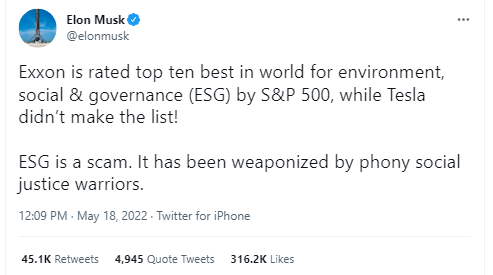On May 25, 2022, the SEC proposed new Environment Social Governance (ESG ) disclosure requirements for ESG funds. With ESG fund flows on the rise, regulators, globally, look to standardize ESG disclosure requirements with the aim of protecting and informing the end investor.
However, as the following recent twitter exchange has highlighted, ESG is complex and hard to measure.
In May, Tesla (TSLA US) was removed from S&P 500’s ESG Index. As part of the annual ESG index review, S&P determined Tesla no longer qualified for ESG inclusion on a relative basis, due to several factors including, “a decline in criteria level scores related to Tesla’s (lack of) low carbon strategy and codes of business conduct”1. Measured on a holistic view of ESG, Tesla, had fallen behind its peers.
Elon Musk, in response, tweeted: “Exxon is a top ten best in world for environment social & governance (ESG) by S&P 500, while Tesla didn’t make the list! ESG is a scam? It has been weaponized by phony social justice warriors.”2

As the war in Ukraine pushes oil prices up, countries around the world are re-thinking their national oil and defense strategies and balancing the requirements between short term and long term E-S-G trade-offs. Extreme oil prices hurt lower-income households disproportionately and defense is a necessity for democratic societies. Investors (and regulators) often put a priority on the E, but Social and Governance issues, often harder to measure, can be in conflict when seeking a singular objective.
Broad-based indexes based on standard market capitalization weighted indexes with constituents reweighted to provide more weight to higher combined ESG scoring stocks are easily available. However, these kinds of indexes only provide risk reduction or reduction in exposure to low scoring companies, and often do not optimize the appropriate trade-offs in capturing targeted investment goals or growth objectives which require complex trade-offs between E, S and G.
MarketVector Indexes GmbH has partnered with Institutional Shareholder Services (ISS) to use ISS ESG data in designing targeted Thematic ESG indexes. Combining MarketVector’s deep Thematic index experience with ISS broad ESG expertise will allow clients to build Thematic ESG indexes that target companies based on very specific and granular E-S-G critera.
For more information on our family of indexes, visit: www.mvis-indices.com
1Source: S&P Dow Jones Indexes, Indexology Blog, 17 May 2022 https://www.indexologyblog.com/2022/05/17/the-rebalancing-act-of-the-sp-500-esg-index/
2Source: Twitter, @elonmusk, 18 May 2022
Get the latest news & insights from MarketVector
Get the newsletterRelated:




